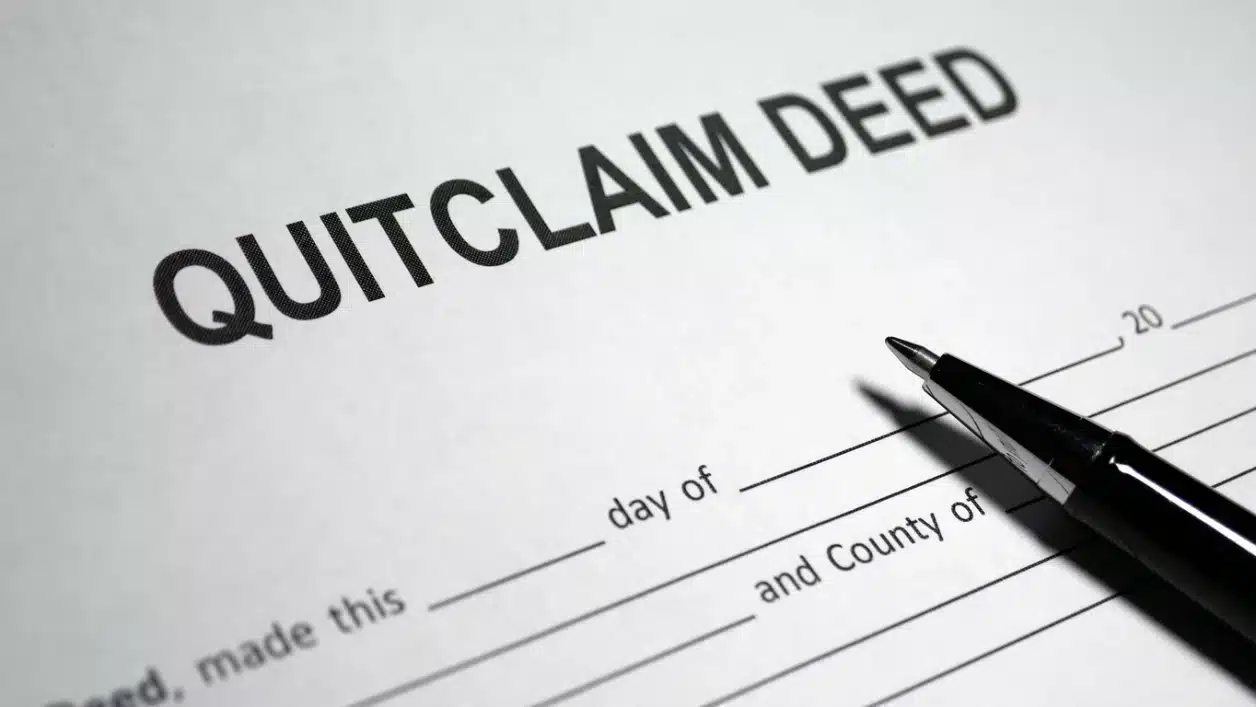As top estate planning attorneys in Denton, TX, we’ve helped countless clients find the best way to transfer their property to another person. Although there is no universal solution when it comes to deeds, there is an ideal strategy for you. Contact us to schedule a free consultation.
Quitclaim Deeds in Estate Planning
Property never stays in one person’s possession forever. Whether by death, inheritance or during-life transfer, property inevitably changes hands.
However, that doesn’t mean it always happens quickly. Most people who come to us about transferring their property aren’t looking for an immediate transfer; they simply want to know the best way to bequeath it upon their death. But what if you need to transfer a property right now?
In the world of estate planning, there’s a tool for just about every task imaginable, including for transferring property quickly. One of the most common strategies for executing a speedy transfer is creating a quitclaim deed.
Despite offering expedience and a handful of other notable benefits, quitclaim deeds also have disadvantages—particularly for their recipients. The best way to find out if a quitclaim deed is appropriate and beneficial for your situation is to consult an experienced quitclaim deed attorney in Denton, TX.
Luckily, you don’t have to look very far. The estate planning team at Hunter Sargent, PLLC, have been helping Denton residents navigate estate planning tools like the quitclaim deed for years. After a thorough evaluation of your situation, we’ll help you select the best tool to accomplish your goals.
Curious about using a quitclaim deed? Make sure to read this article first to find out how they work, when to use them and how you can benefit from our estate planning services.
Need to finish a property transfer fast? Don’t let your urgency push you into a bad deal. Call our law office at (940) 594-7754 to speak with an estate planning and business professional who can help you navigate your situation with confidence.
What Is a Quitclaim Deed?
In simplest terms, a quitclaim deed is a deed without a warranty of title that passes whatever interest or stake that the grantor (person issuing the deed) has in the property to another person. Although a quitclaim deed can successfully transfer ownership of a property if the grantor actually owns it, the document makes no guarantee to the grantee (person receiving the deed) that the title is good.
As a result, these deeds are rarely used in a professional setting to transfer titles in commercial real estate sales. Rather, they are typically used to transfer titles in situations where no money is exchanged, such as between family members, transferring real estate to a trust or when correcting errors on a previous title transaction.
Quitclaim Deed vs. Warranty Deed
Although quitclaim deeds offer a way to quickly transfer property between family members or clear up property title disputes, they are typically much less secure than similar tools, such as the warranty deed.
In contrast to quitclaim deeds, warranty deeds are property deeds that guarantee the grantor has a good title, free from any encumbrances like liens and easements. They differ from quitclaim deeds in a number of key ways, but the following two distinctions are the most important to understand:
- Quitclaim deeds don’t guarantee ownership. Just because the grantor and grantee sign a quitclaim deed doesn’t actually mean that the grantor has the right to the deed or the ability to transfer property ownership. Whereas someone who doesn’t own a property can create a quitclaim deed (typically to correct title errors), only the legal property owner can issue a warranty deed.
- Warranty deeds offer title clearance. Unlike a quitclaim deed, a warranty deed is prepared by a title company. Before issuing warranty deeds, title companies must confirm that properties are free from tax liens, legal claims and similar obstacles. It is important to note that while a general warranty deed covers a property’s entire ownership history, a special warranty deed (also known as a grant deed) only covers the period of time in which it was owned by the seller.
Despite their differences, each deed can theoretically transfer ownership of a property, and each must be stamped by a notary public and filed with a county or city recorder or with a county clerk.
Should I Use a Quitclaim Deed?
As you can see, quitclaim deeds aren’t quite as reliable as many of their alternatives. However, they continue to be a popular option for people hoping to transfer property quickly, despite significant disadvantages.
Advantages of Quitclaim Deeds
Unlike many estate planning tools, quitclaim deeds are surprisingly simple to create. Not only are quitclaim templates readily available online, but completing one doesn’t require help from an attorney (although legal assistance is highly recommended). Because of their simplicity, these deeds can save money and time when a property’s ownership is not in question (such as in transfers between family members).
Additionally, it’s important to know that—despite their potential drawbacks—quitclaim deeds are still legally binding documents. They can be valuable tools for providing proof of ownership in a title search.
Disadvantages of Quitclaim Deeds
Despite being practical and simple, quitclaim deeds offer few reassurances, specifically to the new owner. Because the grantor isn’t required to show proof of title or title insurance in order to sign a quitclaim, it’s possible for someone to issue this deed to transfer property they don’t actually own.
Even if the grantor actually owns the property, the quitclaim deed doesn’t guarantee that the property is free from tax liens and title claims, which is why mortgage lenders insist upon warranty deeds.
When to Use a Quitclaim Deed
If you’re a cautious investor, you may be wondering if there’s ever a good time to use a transfer deed. The following scenarios are examples of times when it may be a good idea to use a quitclaim deed:
- You want to add your spouse’s name to a property that you previously held separately.
- You want to transfer a home to a family member, typically from parent to child.
- You want to transfer your share of an inherited property into a living trust along with your siblings’ shares.
- You want to remove an ex-spouse’s name from a property after a divorce as only one spouse is keeping the home.
- You want to clear a property title after someone with an ownership right wants to release their potential claim.
Depending on your circumstances, a quitclaim deed may be your most attractive option. However, property laws are complex, and transferring ownership isn’t always as easy as it seems. The best way to ensure you’re making a smart decision is to consult with a trusted estate planning attorney in Denton, TX. Fortunately, we’re right around the corner.
Hunter Sargent, PLLC: Trusted Quitclaim Deed Attorneys in Denton, TX
As Denton’s premier estate planning and business planning law firm, Hunter Sargent, PLLC, has helped countless individuals, families and businesses successfully transfer property. No matter what your situation, you can bet our specialists can help you, too.
If you’re considering transferring property or plan to receive property, make sure you’re doing due diligence by consulting with a legal professional first. No matter what type of deed or estate planning assistance you need, we’ll use our legal expertise to protect your future and secure your legacy.
Ready to get started? Visit us online to schedule a case evaluation, or give us a call at (940) 594-7754 to speak with one of our compassionate legal professionals today.



